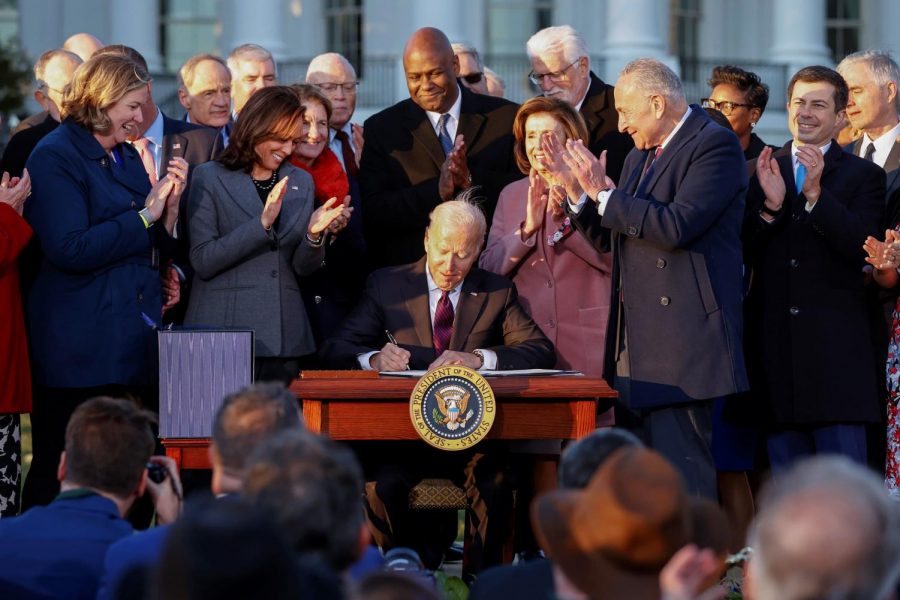President Joe Biden Signs $1.2 Trillion Infrastructure Bill
November 23, 2021
On Monday, November 15, President Joe Biden signed into law the $1.2 trillion Infrastructure Investment and Jobs Act. Surrounded by both Democrat and Republican lawmakers, the White House Ceremony was a bipartisan breakthrough during a time of deeply divided government.
This bill will seek to fix the aging infrastructure in our country. It will eventually benefit almost every American citizen because infrastructure is a key component of our lives.
According to Investopedia, infrastructure can best be defined as “the underlying foundation or framework of a system or organization.” Infrastructure can relate to bridges, ports, and roads that help conduct the transportation of a region, state, or nation. However, it can also relate to “people and systems that make an organization or government function.” This kind of infrastructure can best be referred to as social infrastructure.
Under President Joe Biden’s economic agenda, he addresses both categories of infrastructure: social infrastructure and traditional infrastructure.
Originally, there was a disagreement on what should be addressed first: social infrastructure or traditional infrastructure? Progressives believed that social infrastructure should be addressed first. However, they backed the Democratic Party last minute with the assurance that moderates would support the social infrastructure package, known as the Build Back Better Act.
On Friday, November 5, the House of Representatives passed a bipartisan $1.2 trillion infrastructure package. The bill passed with a 228-206 vote, with 13 Republicans voting yes and all but six Democrats voting yes.
After passing in the Senate with a 69-30 vote, it took three months to be approved by the House of Representatives. Speaker of the House Nancy Pelosi held up the bill by stating that the Build Back Better Act must be addressed first.
Formally known as H.R. 3684 or the Infrastructure Investment and Jobs Act, the package is estimated to cost $1.2 trillion. The spending includes:
- $110 billion for roads and bridges
- $66 billion for railroads
- $65 billion for the power grid
- $65 billion for broadband
- $55 billion for water infrastructure
- $47 billion for cybersecurity and climate change
- $39 billion for public transit
- $25 billion for airports
- $21 billion for the environment
- $17 billion for ports
- $11 billion for safety
- $8 billion for western water infrastructure
- $7.5 billion for electric vehicle charging stations
- $7.5 billion for electric school buses
This past year, the nation’s infrastructure received a C- from the American Society of Civil Engineers. Rail received the highest grade with a B, while transit scored the lowest grade of a D-.
Pete Buttigieg, 2020 presidential candidate and the Secretary of Transportation, spoke at a press briefing on Monday, November 8. Buttigieg shared that his agency would use some of the funding allocated in the bill to address racial inequities in U.S. highway designs.
“I’m still surprised that some people were surprised when I pointed to the fact that if a highway was built for the purpose of dividing a White and a Black neighborhood,” he shared, “or if an underpass was constructed such that a bus carrying mostly Black and Puerto Rican kids to a beach — or it would have been — in New York, was designed too low for it to pass by, that that obviously reflects racism that went into those design choices. I don’t think we have anything to lose by confronting that simple reality.”
Like Buttigieg shared, several Americans are unaware of the systemic racism that is closely intertwined with U.S. infrastructure. For instance, the Federal-Aid Highway Act of 1956 intentionally routed highways that went directly through African-American and minority neighborhoods. Deborah Archer, a professor at the New York University School of Law and national board president of the American Civil Liberties Union, shared her thoughts on the infrastructure package with NPR.
“Our transportation systems have really led to racial disparities and discrimination, which are reinforced daily from highways, roads, bridges to sidewalks and public transit,” she said. “We make it harder for Black people and other people of color to access and take advantage of opportunities.
The program called “Reconnecting Communities,” led by the Department of Transportation and Buttigieg, will focus on the “legacy of highway construction built through communities.”
Congresswoman Mikie Sherill who represents the town of Wayne and the 11th district of New Jersey was one of the many avid supporters of this infrastructure package. In her statement, she said, “For too long, New Jerseyans have endured tough commutes – described by some as ‘hell’ and a ‘daily nightmare.’ It takes them away from their families and makes the daily commute a constant guessing game of whether or not they will arrive at a meeting or kid’s soccer game on time.”
Many parents of Hills’ students who commute to the city can certainly understand this struggle. With delays, lack of trains, and long wait times, this bill can significantly improve daily lives, even the lives of Wayne Hills’ students.
With the passage of the Infrastructure Investment and Jobs Act, Democrats have now turned their attention to the Build Back Better Act. The ambitious $3.5 billion bill will allocate funds to several social issues/affairs such as the Veterans Affairs Committee, Judiciary Committee, Banking Committee, and the Health, Labor, Education, and Pensions Committee. However, it is unclear whether or not this bill will pass.
Sean Kim, a staff writer for the Patriot Press and senior at Wayne Hills, shared his opinions on the infrastructure bill. “I don’t want to be too optimistic or overreaching at the moment and say that it will affect my life tremendously but I do think it gives a good sense of hope for what can be improved and accomplished with the bill,” he shared. “I think it’s ultimately a good step for bipartisan support.”
Noah Heller, a senior at Wayne Hills, also weighed in on the bill. “The infrastructure bill is loaded with pork-barrel spending that does not put vital funding into American industry and manufacturing infrastructure, and instead will increase taxes on the American working class and will levy heavy spending on green energy that does not reach the average American,” Heller said.
If we look at the bipartisan support the Infrastructure Investment and Jobs Act spurred, we can hope that we continue to see the partisan divide in our country shrink.







